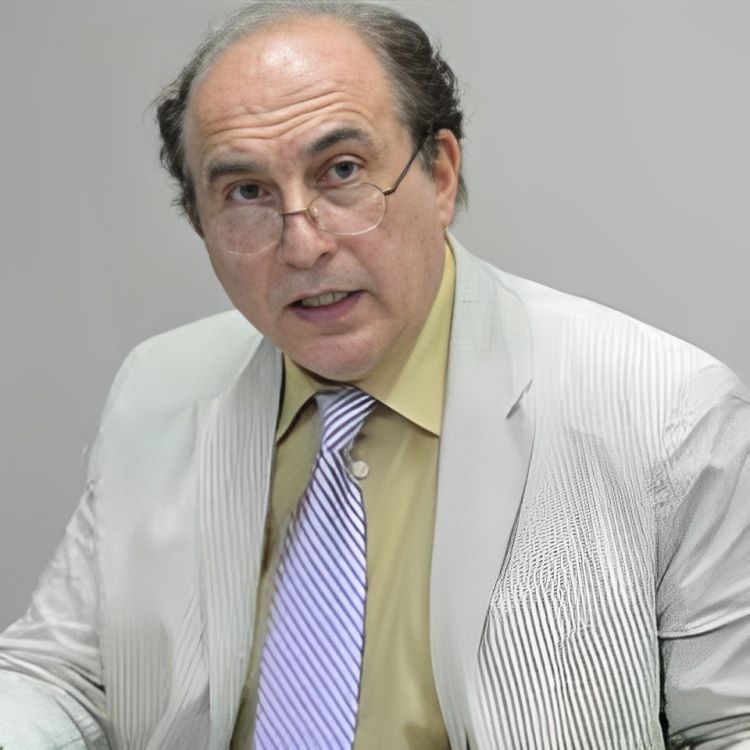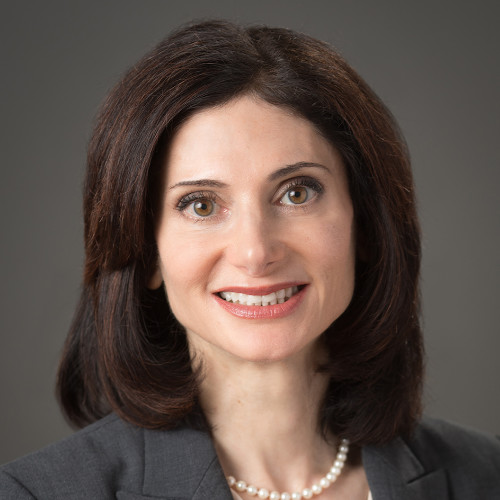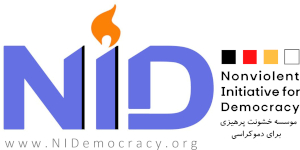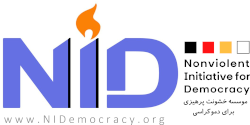
Nonviolent Initiative for Democracy Inc. (NID) is a non-profit organization that aims to teach the principles and methods of nonviolence in the process of establishing democracy. We believe that in developing societies the road to democracy will be better paved and stronger, if it is through nonviolent struggle, dissemination of democratic and peaceful norms and values, and promotion of pluralism and tolerance.
We maintain that belief in pluralism in theory and practice, peaceful coexistence, tolerance, and respect for freedom of thought, are pre-conditions for democracy as well as a better world without violence. Thus the dissemination of nonviolence principle in all facets of individual and collective life constitutes the essence of our efforts. We endeavor to contribute to the goal of global peace and security and establishment of democracy, as well as treating these goals as a universal set of values.
Since we believe in institutionalizing nonviolence, we aim to raise consciousness in different societies with regard to the following issues: secularism and nonviolence; the roots of nonviolence in different religions; creating tolerance and respect between believers and secular individuals; methods of nonviolent struggle; rule of law; expansion of political participation and civil society; expansion of dialogue, communication and coexistence on the national and international levels; transparency, responsibility and accountability of the government;
“NID” believes that in order attain democracy the citizens must be empowered. Therefore, we strive to achieve the following goals:
Empowering people to achieve democracy by:
- Promotion of Culture of Nonviolence;
- Promoting electoral democracy through raising public awareness and electoral reform to ensure free and fair elections. Educating ordinary citizens to monitor elections and report fraud;
- Defending rule of law, civil and political rights, liberty, and justice for all;
- Encouraging people to develop civil society and increase their political participation;
- Promoting a culture of equality and affirming actions to ensure full participation of all citizens regardless of gender, ethnicity, race, class, and religion;
- Defending freedom of speech and press;
- Advocating for responsibility, accountability, and transparency in government;
- Supporting an economic system that promotes initiative among individuals while supporting equal opportunity and chance for participation for all;
- Advocating individual rights and fostering social pluralism and co-existence;
- Building relations between external and internal actors in the process of democratization around the globe;
Board of Directors

Farzin Vahdat Clerk, Treasurer & Board Member
Dr. Farzin Vahdat is the chief research officer of the Nonviolent Initiative for Democracy (NID). Dr. Vahdat holds a Ph.D. in sociology from Brandeis University and is an authority in the analysis of the concepts and conditions of modernity and their application to Iran, Islam and the Muslim world. Vahdat is the author of God and Juggernaut: Iran’s Intellectual Encounter with Modernity (Syracuse University Press, 2002), of the forthcoming Islamic Ethos and the Specter of Modernity, and of numerous articles in English and Persian, a number of which have been translated into various languages, including Swedish, Italian, and Spanish. Dr. Vahdat has taught at Tufts, Harvard and Yale Universities and Vassar College and is currently conducting research at Vassar.

Monique Kornfeld Board Member
Attorney Monique Kornfeld has extensive experience in all aspects of immigration law, including employment-based and family-based immigrant visa petitions and applications for legal permanent residency, nonimmigrant visa petitions, asylum applications and relief from deportation. She has represented major hospitals and healthcare clinics, prestigious academic research institutions, public corporations, start-up technology companies, research scientists, IT workers and individuals sponsoring family members. She is admitted to the Massachusetts State Bar and the First Circuit of the U.S. Court of Appeals.
Attorney Kornfeld earned her J.D. from Boston College Law School (1995) and B.A. from Union College (1988). She is a member of the American Immigration Lawyers Association and the Women’s Bar Association and on the Steering Committee of Business Lawyers Network. She is a frequent presenter to foreign students on H-1B visas and green card applications and has spoken at Harvard University, Northeastern University, Tufts University and Babson College. She has also presented on worksite enforcement and the Form I-9 employment eligibility verification requirement.
Honorary Board
Adam Michnik
Adam Michnik is the editor-in-chief of Gazeta Wyborcza. He was one of the leading organizers of the illegal, democratic opposition in Poland. A historian, essayist, and political commentator, he is the recipient of laureate of many awards and distinctions including Robert F. Kennedy Human Rights Award(1986),Prize winner of Prix de la Liberte of the French PEN-Club (1988), Europe’s Man of the Year (1989) – prize awarded by the magazine La Vie ,OSCE Prize for Democracy and Journalism (May 1996), Grand Cross of the Order of Merit of the Federal Republic of Germany (2001), French Legion of Honor ( [France] , 2003) , and Dan David Prize award 2006 . He was listed by “Financial Times” as one of the 20 most influential journalists in the world.
Payam Akhavan
Dr. Akhavan teaches and researches in the areas of public international law, international criminal law and transitional justice, with a particular interest in human rights and multiculturalism, war crimes prosecutions, UN reform and the prevention of genocide. He was previously the Boulton Senior Fellow at McGill, Distinguished Visiting Professor at the University of Toronto Faculty of Law, and Visiting Lecturer and Senior Fellow at Yale Law School and the Yale University Centre for International and Area Studies. He has published extensively including “Beyond Impunity: Can International Criminal Justice Prevent Future Atrocities?” (2001) 95 American Journal of International Law 7 (www.asil.org/ajil/recon2.pdf) selected by the International Library of Law and Legal Theory as one of “the most significant published journal essays in contemporary legal studies.” He is also the author of the Report on the Work of the Office of the Special Advisor of the United Nations Secretary-General on the Prevention of Genocide (2005).
Professor Akhavan was the first Legal Advisor to the Prosecutor’s Office of the International Criminal Tribunals for Former Yugoslavia and Rwanda and played a key role in the development of its foundational jurisprudence. He also has considerable experience in post-conflict peace-building and international dispute settlement, having advised the UN on transitional justice, appearing as counsel before international courts and tribunals on behalf of sovereigns, and serving on the board of directors of human rights NGOs, including the Iran Human Rights Documentation Centre (www.iranhrdc.org), in New Haven, of which he is also the president and co-founder. His work has been featured in the New York Times and, in recognition of his contributions to promoting accountability for human rights violations, he was selected by the World Economic Forum as a Young Global Leader (www.younggloballeaders.org) in 2005.
Andrew Arato
Dr. Arato is the Dorothy Hart Hirshon Professor in Political and Social Theory, has taught at Ecole des hautes etudes, and Sciences Po in Paris, and the Central European University in Budapest, had a Fulbright teaching grant to Montevideo in 1991, and was Distinguished Fulbright Professor at the GoetheUniversity in Frankfurt/M, Germany. Professor Arato has served as a consultant for the Hungarian Parliament on constitutional issues: 1996-1997, and as U.S. State Department Democracy Lecturer and Consultant (on Constitutional issues) Nepal 2007. The scholarly research of Professor Arato is widely recognized and conferences and sessions have been organized around his work at University of Glasgow Law School in Spring 2009; and KocUniversity, Istanbul, in December 2009, as well as at the Faculty of Law. Witwaterstrand University, Johannesburg, South Africa, in August 2010.
Andrew Arato have also been appointed Honorary Professor, and Bram Fischer Visiting Scholar at the School of Law, University of Witwatersrand Johannesburg (June 2010 – June 2011); Civil Society, Constitution, and Legitimacy (2000); Habermas on Law, Democracy, and Legitimacy (coeditor, 1998); Civil Society and Political Theory (coauthor,1994); From Neo-Marxism to Democratic Theory (1993); Civil Society and Political Theory (coauthor, 1992)
Fred Dallmayr
Dr. Fred R. Dallmayr is Packey J. Dee Professor in the departments of philosophy and political science at the University of Notre Dame. He holds a Doctor of Law degree from the University of Munich (1955) and a Ph.D. in political science from Duke University (1960). He has been a visiting professor at Hamburg University in Germany and at the New School for Social Research in New York, and a Fellow at Nuffield College in Oxford. He has been teaching at Notre Dame University since 1978. During 1991-92 he was in India on a Fulbright research grant. Among his recent publications are: Between Freiburg And Frankfurt (1991); The Other Heidegger (1993); Beyond Orientalism: Essays On Cross-Cultural Encounter (1996; Japanese translation 2001); Alternative Visions: Paths In The Global Village (1998: Persian translation 2005); Achieving Our World: Toward a Global and Plural Democracy (2001); Dialogue Among Civilizations: Some Exemplary Voices (2002; Italian translation forthcoming); Hegel: Modernity And Politics (new ed. 2002); Peace Talks – Who Will Listen (2004); Small Wonder: Global Power and Its Discontents (2005) and In Search of the Good Life: A Pedagogy for Troubled Times (2007). He is past president of the Society for Asian and Comparative Philosophy (SACP). He is also a member of the International Coordinating Committee of “World Public Forum – Dialogue of Civilizations”, and of the Scientific Committee of “RESET – Dialogue on Civilizations.”
Ronald Sharp
Dr. Ronald Sharp is Professor of English at Vassar College, where he was Dean of the Faculty from 2003 to 2008. Before he came to Vassar he was Acting President, John Crowe Ransom Professor of English, and Provost of Kenyon College, where he was also Editor of The Kenyon Review. His special interests include nineteenth-century British literature, contemporary poetry, Australian literature, Romanticism, and the literature of friendship.
Sharp is the author or editor of six books, including Keats, Skepticism, and the Religion of Beauty; Friendship and Literature: Spirit and Form; Reading George Steiner (with Nathan A. Scott, Jr.); The Persistence of Poetry: Bicentennial Essays on John Keats (with Robert M. Ryan); and Selected Poems of Michael S. Harper. With the late novelist and short-story writer Eudora Welty, he edited The Norton Book of Friendship.
His articles and reviews have appeared in such journals as New Literary History, Paris Review, New England Review, Australian Literary Review, American Literature, Modern Philology, English Language Notes, TriQuarterly, Keats-Shelley Journal, and The Wordsworth Circle. A graduate of Kalamazoo College, Sharp holds a master?s degree from the University of Michigan and a doctorate from the University of Virginia. He is the recipient of fellowships from various foundations, including the American Council of Learned Societies, the National Endowment for the Humanities, the Ford Foundation, and the National Humanities Center.
Roberto Toscano
Roberto Toscano is the Italian diplomat. In the diplomatic carrier since 1969, he directed for several years the activities of the analysis and programming unit of the Italian Ministry of Foreign Affairs. . He published several essays on the topics of human rights and of the ethics of international relationships. He taught International Relationships at LUISS University in Rome. Amongst his books Soviet human rights policy and Perestroika, Beyond Violence. He is President of the Intercultura Foundation.
Financial Resources
The NID was created by the personal resources of the founding members and we maintain strict standards for independence. To achieve our goals we seek financial help from individuals, government and non-government organizations, as well as international and public institutions, while maintaining our standards of independence. We do not accept any funds from institutions and organizations, whether part of a government or non-governmental agencies, which are involved in violence or promote culture of violence.
Region of Focus
In our efforts to encourage governments and citizens toward non-violence, we do not restrict our activities to a particular region. Our priority, however, is the region that we can impact most. Therefore, the Persian speaking countries of Central Asia, the Middle East, the Islamic world, and beyond, will be areas of interest in the later phases of our project.

